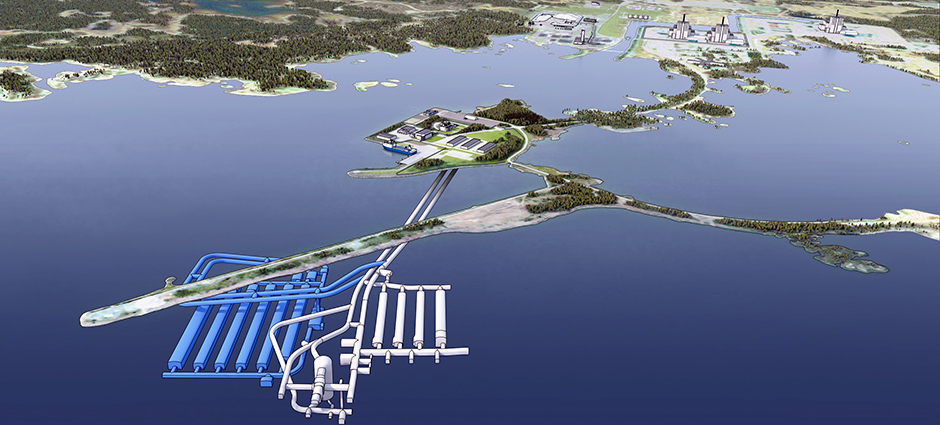This text is older than 6 years old and could contain inactive information.
Time for the main hearing regarding the extension of SFR
SKB has applied for a licence to extend the final repository for short-lived radioactive waste, SFR, which has been in operation in Forsmark since 1988. The Land and Environment Court will try the matter according to the Swedish Environmental Code and will hold a main hearing in the case, starting 23 September.
The present SFR is used for final disposal of waste from the operation of the nuclear power plants. The waste may consist of filters that have collected radioactive elements in the reactor water, used tools and protective clothing. But also radioactive waste from medical care, veterinary care, research and industry is disposed of in SFR. The extended facility is needed to provide space for final disposal of low- and intermediate-level operational and decommissioning waste from the Swedish nuclear power plants.
– The absolute majority of the waste, around 90 percent, that arises when decommissioning a nuclear power plant is conventional construction waste. In addition, a small part can be disposed of in near-surface repositories or released for unrestricted use. The remainder is waste that is classified as short-lived waste and that will be disposed of in SFR. So to provide space for the short-lived decommissioning waste, we must extend the SFR facility, says Peter Larsson, SKB’s project manager for the licensing process.
A small fraction of the decommissioning waste is classified as long-lived waste and will be disposed of in the planned final repository for long-lived waste, SFL. SFL is planned to be in operation in the 2040s.
An extensive licensing process before obtaining a licence
The process of obtaining a licence to extend the repository is both long and extensive. At the end of 2014, SKB submitted an application for the extension and continued operation of SFR under both the Environmental Code and the Nuclear Activities Act. The application under the Environmental Code is first examined by the Land and Environment Court and then by the Government, while the application under the Nuclear Activities Act is examined by the Swedish Radiation Safety Authority and the Government.
Regulatory authority experts have reviewed the documentation submitted by SKB and, at the same time, a large number of reviewing bodies have had the opportunity to provide their comments during the process.
– The reviewing bodies have raised important questions during the course of the review. SKB has considered, analysed and answered these questions, says Peter Larsson.
The main hearing takes place between 23 September and 3 October and will be held in the court premises in Stockholm. One day is located in Forsmark for an inspection of the site and the operations. The inspection gives the court members and the reviewing bodies the possibility to observe the conditions at the site with their own eyes.
The Swedish Radiation Safety Authority, SSM, has in its opinion to the Court judged that SKB’s application for extended operations in SFR is permissible according to the Environmental Code.
Parallel licensing under the Nuclear Activities Act
In parallel with the licensing under the Environmental Code, SSM’s examination of the application under the Nuclear Activities Act is also in progress. SSM plans to submit its opinion to the Government according to the Nuclear Activities Act at the same time as the Court gives its opinion under the Environmental Code.
SKB expects all licences to have become legally binding around 2023. Thereafter, the construction work can be initiated. It is then estimated to take about six years.
Published: 23 September 2019
News
-
Technology development and optimisation for best available technology
SKB is continuously working to develop and optimise the design of all the barriers in the final repository for spent nuclear fuel, with stringent requirements for long-term safety. The development work also involves industrialising manufacturing processes as well as construction and deposition proce…Published: 23 December 2025
-
SKB signs new agreement with South Korean repository organisation
Swedish Nuclear Fuel and Waste Management Company, SKB, through its subsidiary SKB International, has signed a new Memorandum of Understanding with its counterpart in South Korea, Korea Radioactive Waste Agency (KORAD). The agreement, which is an information exchange agreement, strengthens the relat…Published: 18 November 2025
-
SKB presents new research programme
SKB has submitted its eighteenth research programme to the Swedish Radiation Safety Authority. The report provides a comprehensive overview of progress made and outlines SKB’s future research direction. Every three years, SKB presents a Research, Development and Demonstration programme for the manag…Published: 6 October 2025
-
SKB signs collaboration agreement for the Spent Fuel Repository
SKB has signed a collaboration agreement with Implenia for the construction of the Spent Fuel Repository’s hard rock facility in Forsmark. The assignment includes access routes down to a repository level of 500 metres and the first parts of the final repository.Published: 18 June 2025
-
Drones streamline inspections and patrols at SFR
At the Final Repository for Short-Lived Radioactive Waste, SFR, in Forsmark, the maintenance team has invested in a drone to improve the work environment and streamline their work. The investment has already paid for itself during the first few months of the year through more efficient inspections a…Published: 17 June 2025
Published: 23 September 2019
